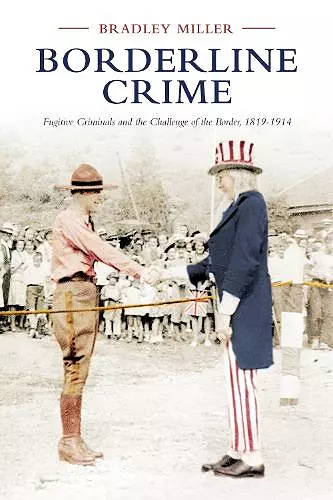Borderline Crime
Fugitive Criminals and the Challenge of the Border, 1819-1914
Format:Hardback
Publisher:University of Toronto Press
Published:11th Oct '16
Currently unavailable, and unfortunately no date known when it will be back

"Professor Miller's fascinating book makes a valuable contribution to international legal history and to our understanding of the relationships between international, British imperial and Canadian law at the high and low levels - which turn out to look remarkably different from one another - and of circuits of law within the British Empire." -- Karen Knop, Faculty of Law, University of Toronto "Miller is not only intimately familiar with but also extensively and very appropriately uses the internal literature on extradition, asylum, and related issues as the foundation of his study. Borderline Crime is an intriguing and illuminating study." -- Jane Errington, Department of History, Queen's University
Borderline Crime examines how law reacted to the challenge of the border in British North America and post-Confederation Canada.Miller also reveals how the law remained confused, amorphous, and often ineffectual at confronting the threat of the border to the rule of law.
From 1819 to 1914, governments in northern North America struggled to deal with crime and criminals migrating across the Canadian-American border. Limited by the power of territorial sovereignty, officials were unable to simply retrieve fugitives and refugees from foreign territory.
Borderline Crime examines how law reacted to the challenge of the border in British North America and post-Confederation Canada. For nearly a century, officials ranging from high court judges to local police officers embraced the ethos of transnational enforcement of criminal law. By focusing on common criminals, escaped slaves, and political refugees, Miller reveals a period of legal genesis where both formal and informal legal regimes were established across northern North America and around the world to extradite and abduct fugitives. Miller also reveals how the law remained confused, amorphous, and often ineffectual at confronting the threat of the border to the rule of law. This engrossing history will be of interest to legal, political, and intellectual historians alike.
‘Miller’s excellent book is a welcome addition to work on extradition examining everyday legal practices and their underlying jurisprudence foundations… It provides an important study into the intersection between international, British imperial and Canadian law.’
- Emily Whewell (Legal History vol 25:2017)"An important and helpful book for legal historians of the Canada-US border, [Borderline Crime] lays a framework for examining how the border was interpreted as a legal and political entity during its most formative years in the nineteenth century. "
- Brandon Dimmel (BC Studies no. 198, Summer 2018)"This is a scholarly, closely argued book, but it will have appeal to a wide audience. Bradley Miller illustrates his themes with engaging and entertaining examples and writes clearly and concisely…Borderline Crime should become required reading in colonial, early Canadian, and North American international and diplomatic history."
- Lori Chambers, Lakehead University (University of Toronto Quarterly, vol 87 3, Summer 2ISBN: 9781487501273
Dimensions: 236mm x 163mm x 25mm
Weight: 600g
304 pages